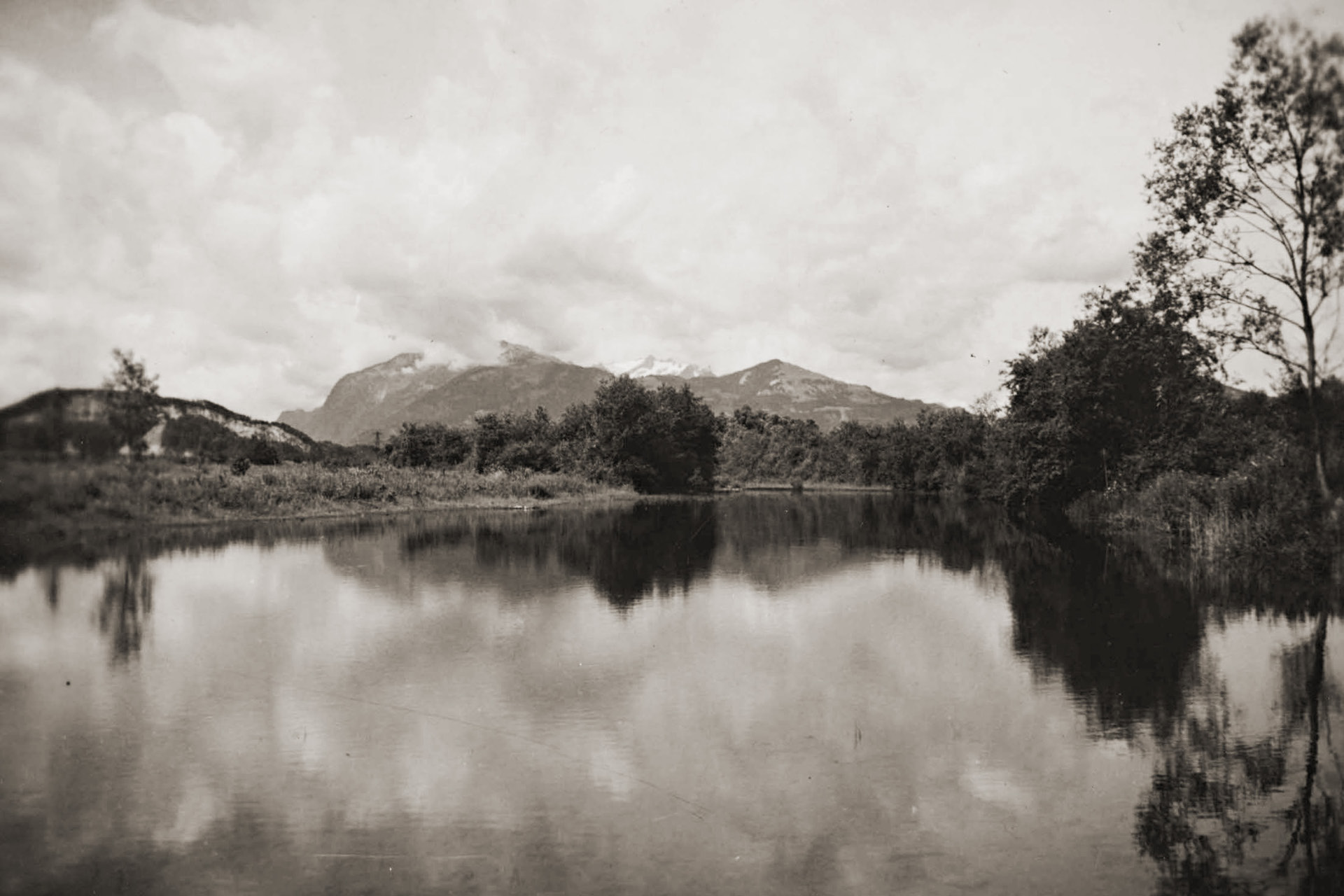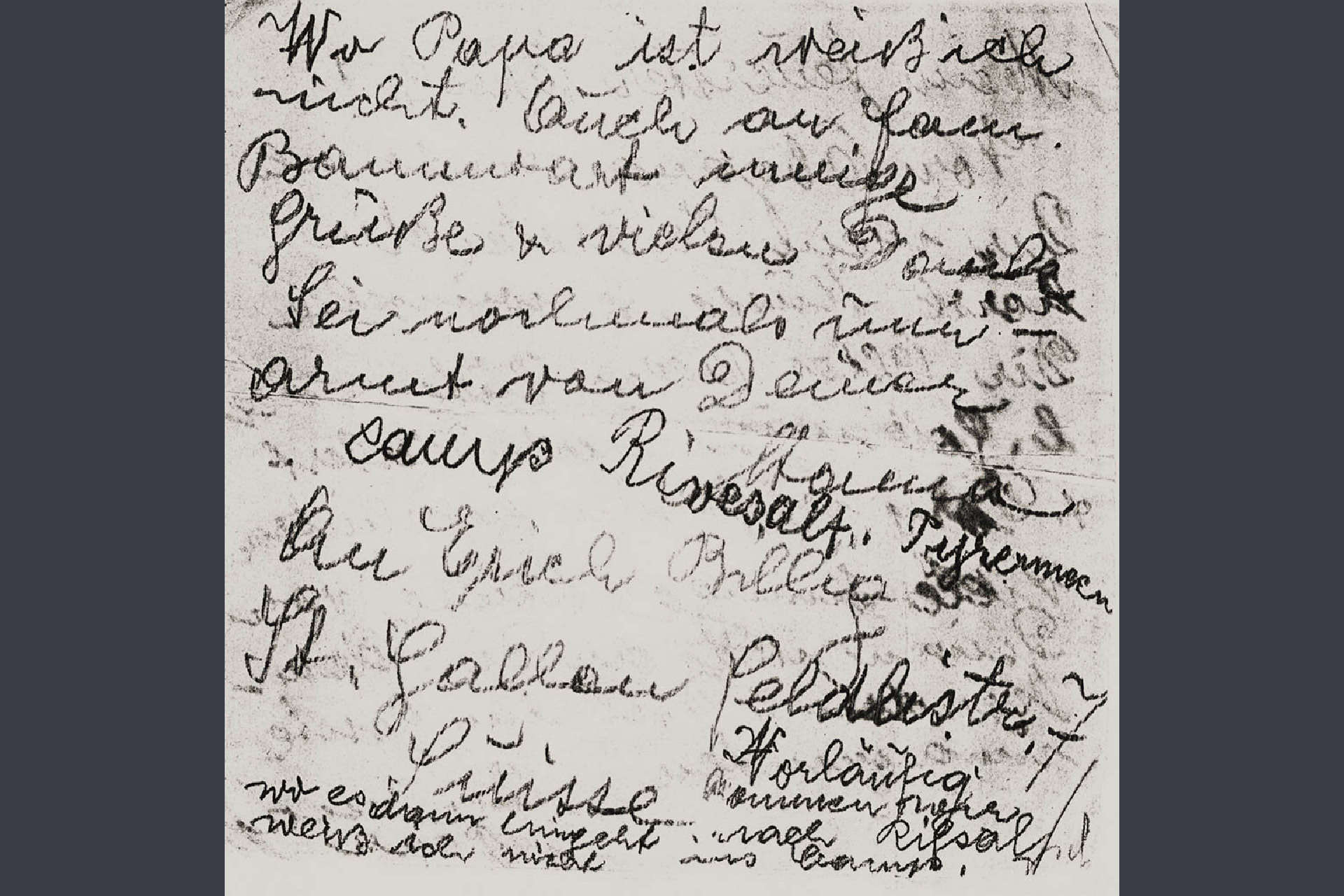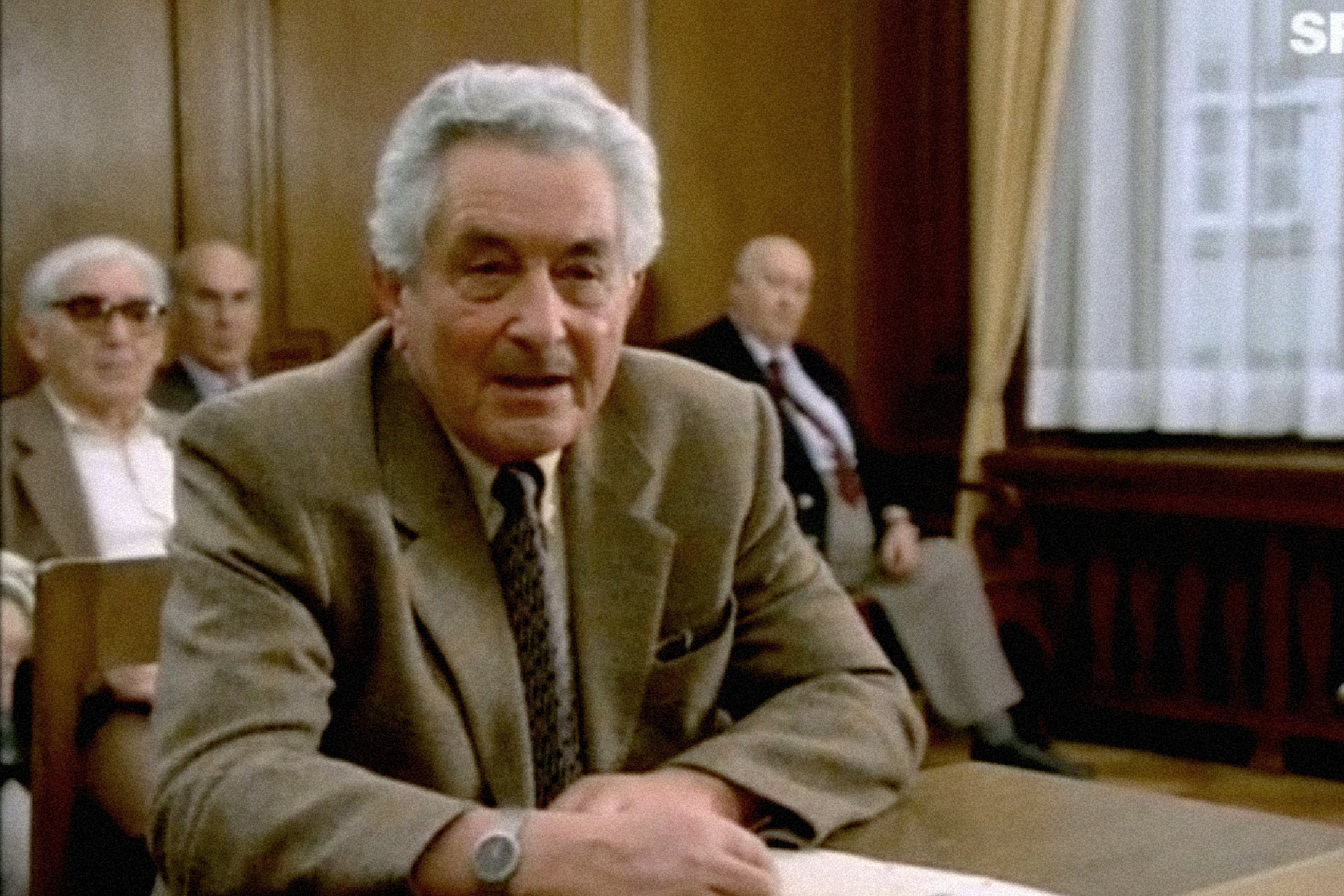Erich Billig> November 1938
30 Erich Billig
”Where it will go then I don't know”. Erich Billig makes it to Switzerland. And receives a last letter from his mother
Altach – Diepoldsau – St. Gall, November 1938
”My dearest Erich,
Before leaving, I send you my dearest the warmest kisses + wish you all the best + may God continue to protect you. Many heartfelt kisses from your always thinking of you + embracing you in spirit
Mom
Camp Rivesalt, Pyrenees”[1]
In 1942, Erich Billig receives a letter from his mother in St. Gall. In 1938, he had fled Vienna. After the ”Kristallnacht” pogrom, Gisèle Billig sent her fourteen-year-old son westward with two acquaintances to illegally escape to Switzerland. She herself waited in Vienna for her husband, who had been deported to Dachau.
In May 2012, when the border bridge between Hohenems and Diepoldsau was named after Paul-Grüninger, Erich Billig recalled his escape:
“Three of us drove as far as Altach near the border, where we stayed at the inn there. Quite soon we had a visit from a gendarme still dressed in Austrian uniform. He promised to take us across the border, for a fee of course, and also exerted pressure. When he came in the evening in civilian clothes, he led us to the almost dry bed of the Old Rhine and left us standing there with the remark that Switzerland was on the other bank. We then ran directly into the hands of a Swiss customs officer accompanied by the dog. We spent the night locked up in the Diepoldsau customs house, and in the morning we were sent back across the bridge, which is to be named today, where the Gestapo took care of us.”
The three managed to make a second escape attempt. This time with the help of two smugglers from Switzerland, who take them across the border at Schmitter customs. They were able to sleep with a family and dry their belongings before crossing the Rhine bridge, which was also guarded, to Widnau, hidden under the canvas cover of a truck.
At the end of November 1938, Erich Billig stands in front of Paul Grüninger in St. Gall, who utters the redeeming words. “You can stay”. Billig is interned in the Diepoldsau camp for three weeks, then a family in St. Gall takes him in. At first, he is not allowed to work nor to do an apprenticeship; the aliens police does not allow refugees to do any paid work. It was only when a Jewish entrepreneur intervened on Erich's behalf that he was able to learn the trade of a mechanic in Rorschach.
In 1942, the letter from his mother arrives at the Bannwart family in St. Gall. He reads:
”I don't know where Dad is. Many greetings also to the Bannwart family. Be hugged again by your Mama.
For the time being we are going to the camp in Rifsalt (sic!). Where it goes then, I don't know.”
Gisèle Billig was not able to send this letter by mail. She had fled from Vienna to Italy. From there to the south of France. She is not allowed to enter Switzerland to see her son. Finally she is interned in Rivesaltes. She throws the letter out of the window of the deportation train. Someone finds it and actually sends it to St. Gall.
From Rivesaltes, Gisèle Billig is deported to the Drancy transit camp in Paris. On September 7, 1942, she is deported to Auschwitz.
Erich Billig never heard from her again. After the war, he marries Hildegard Bannwart, the daughter of his foster family. Hildegard thus loses her Swiss citizenship for years. Switzerland does not make it easy for the two. It takes a long time before they both can obtain Swiss citizenship. Billig makes a career in various machine factories and the two move to western Switzerland, starting a new life.
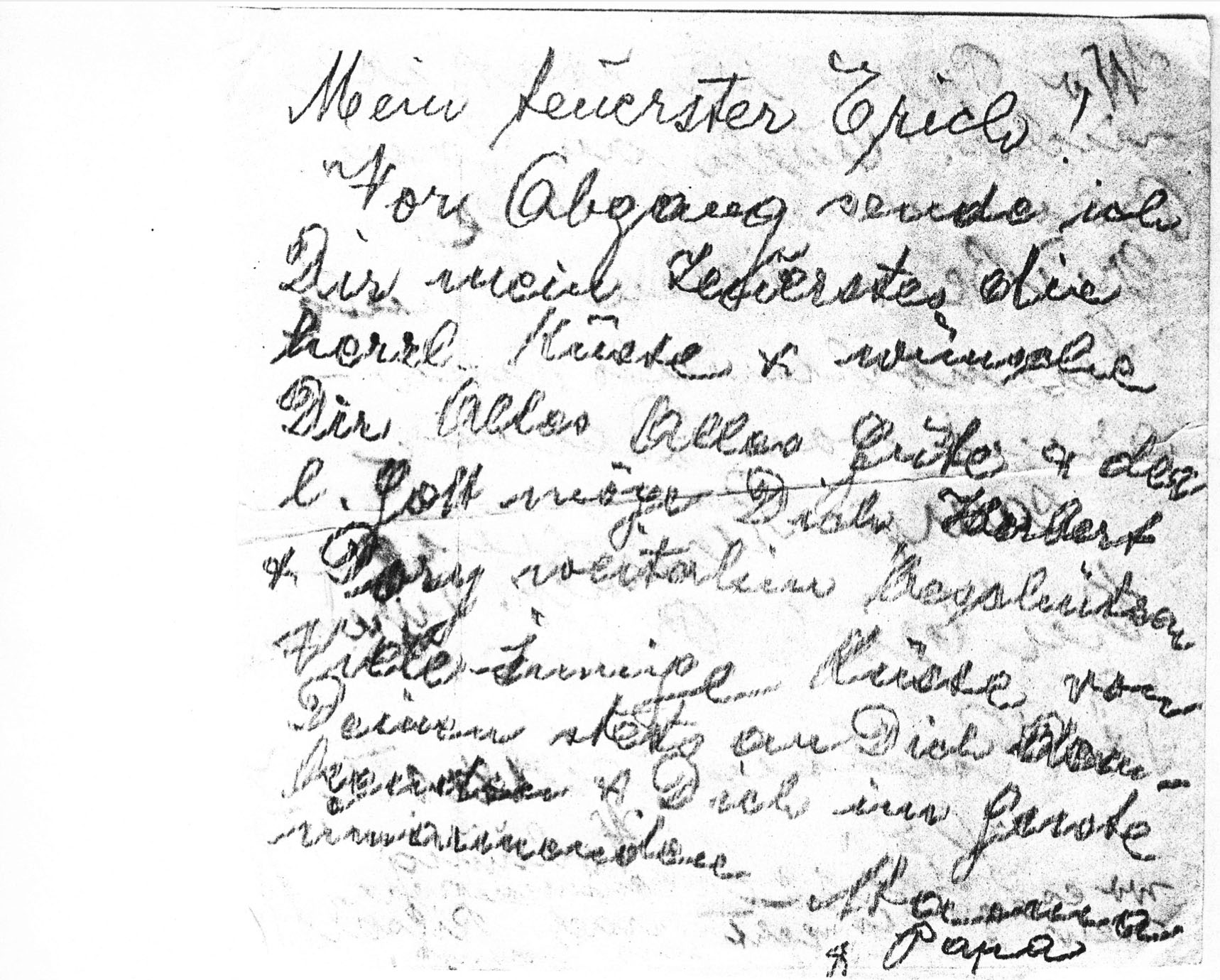
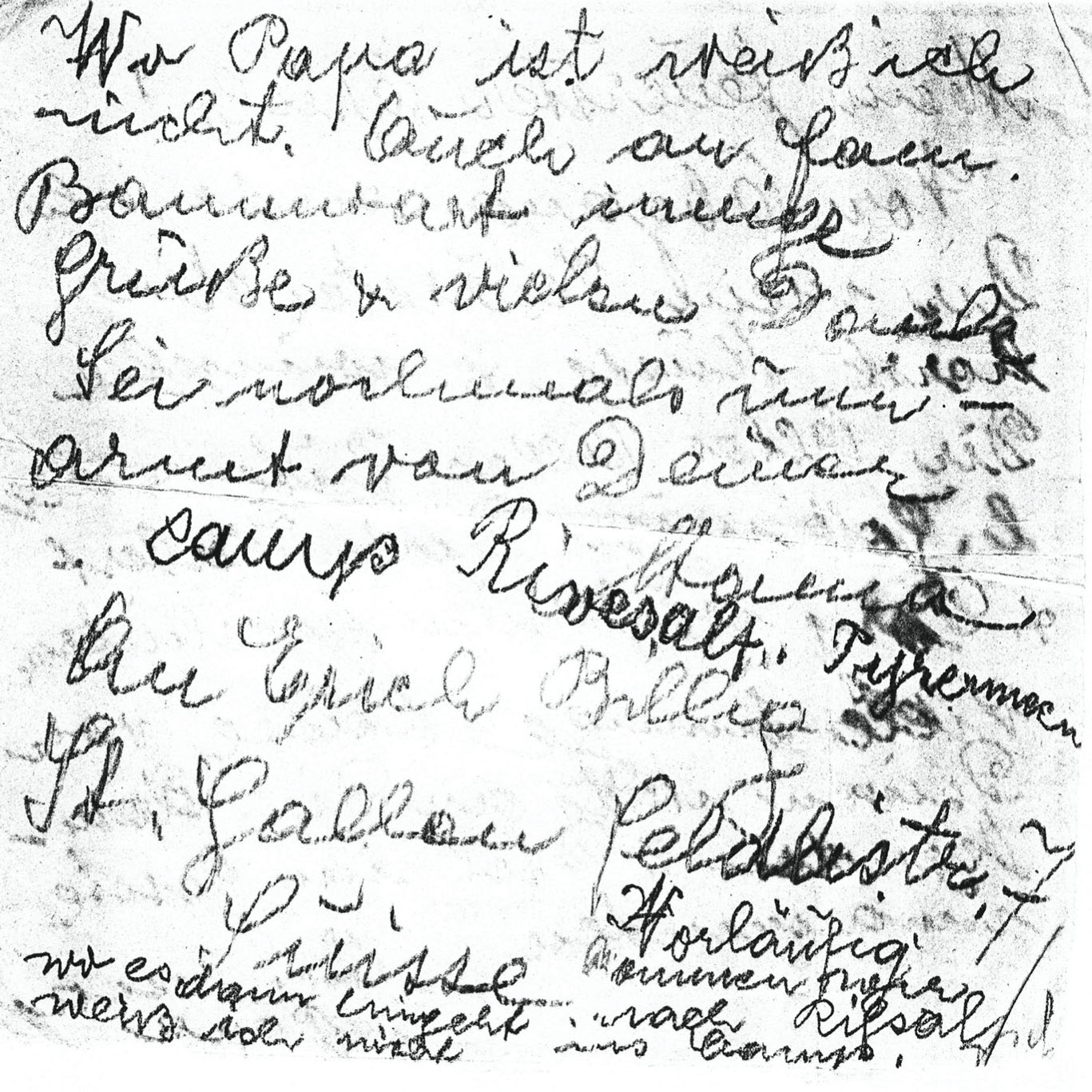 Letter from Gisèle Billig to Erich Billig, 1942
Letter from Gisèle Billig to Erich Billig, 1942
Archive Stefan Keller, Zurich
30 Erich Billig
”Where it will go then I don't know”. Erich Billig makes it to Switzerland. And receives a last letter from his mother
Altach – Diepoldsau – St. Gall, November 1938
”My dearest Erich,
Before leaving, I send you my dearest the warmest kisses + wish you all the best + may God continue to protect you. Many heartfelt kisses from your always thinking of you + embracing you in spirit
Mom
Camp Rivesalt, Pyrenees”[1]
In 1942, Erich Billig receives a letter from his mother in St. Gall. In 1938, he had fled Vienna. After the ”Kristallnacht” pogrom, Gisèle Billig sent her fourteen-year-old son westward with two acquaintances to illegally escape to Switzerland. She herself waited in Vienna for her husband, who had been deported to Dachau.
In May 2012, when the border bridge between Hohenems and Diepoldsau was named after Paul-Grüninger, Erich Billig recalled his escape:
“Three of us drove as far as Altach near the border, where we stayed at the inn there. Quite soon we had a visit from a gendarme still dressed in Austrian uniform. He promised to take us across the border, for a fee of course, and also exerted pressure. When he came in the evening in civilian clothes, he led us to the almost dry bed of the Old Rhine and left us standing there with the remark that Switzerland was on the other bank. We then ran directly into the hands of a Swiss customs officer accompanied by the dog. We spent the night locked up in the Diepoldsau customs house, and in the morning we were sent back across the bridge, which is to be named today, where the Gestapo took care of us.”
The three managed to make a second escape attempt. This time with the help of two smugglers from Switzerland, who take them across the border at Schmitter customs. They were able to sleep with a family and dry their belongings before crossing the Rhine bridge, which was also guarded, to Widnau, hidden under the canvas cover of a truck.
At the end of November 1938, Erich Billig stands in front of Paul Grüninger in St. Gall, who utters the redeeming words. “You can stay”. Billig is interned in the Diepoldsau camp for three weeks, then a family in St. Gall takes him in. At first, he is not allowed to work nor to do an apprenticeship; the aliens police does not allow refugees to do any paid work. It was only when a Jewish entrepreneur intervened on Erich's behalf that he was able to learn the trade of a mechanic in Rorschach.
In 1942, the letter from his mother arrives at the Bannwart family in St. Gall. He reads:
”I don't know where Dad is. Many greetings also to the Bannwart family. Be hugged again by your Mama.
For the time being we are going to the camp in Rifsalt (sic!). Where it goes then, I don't know.”
Gisèle Billig was not able to send this letter by mail. She had fled from Vienna to Italy. From there to the south of France. She is not allowed to enter Switzerland to see her son. Finally she is interned in Rivesaltes. She throws the letter out of the window of the deportation train. Someone finds it and actually sends it to St. Gall.
From Rivesaltes, Gisèle Billig is deported to the Drancy transit camp in Paris. On September 7, 1942, she is deported to Auschwitz.
Erich Billig never heard from her again. After the war, he marries Hildegard Bannwart, the daughter of his foster family. Hildegard thus loses her Swiss citizenship for years. Switzerland does not make it easy for the two. It takes a long time before they both can obtain Swiss citizenship. Billig makes a career in various machine factories and the two move to western Switzerland, starting a new life.


